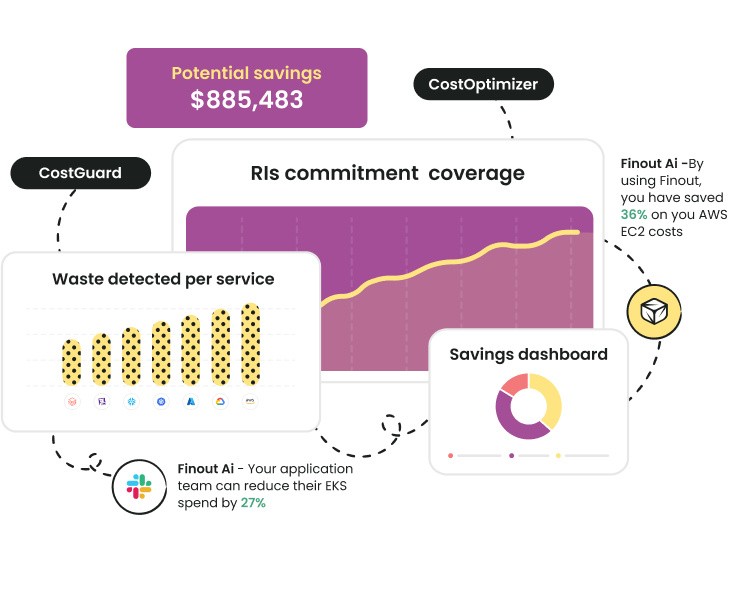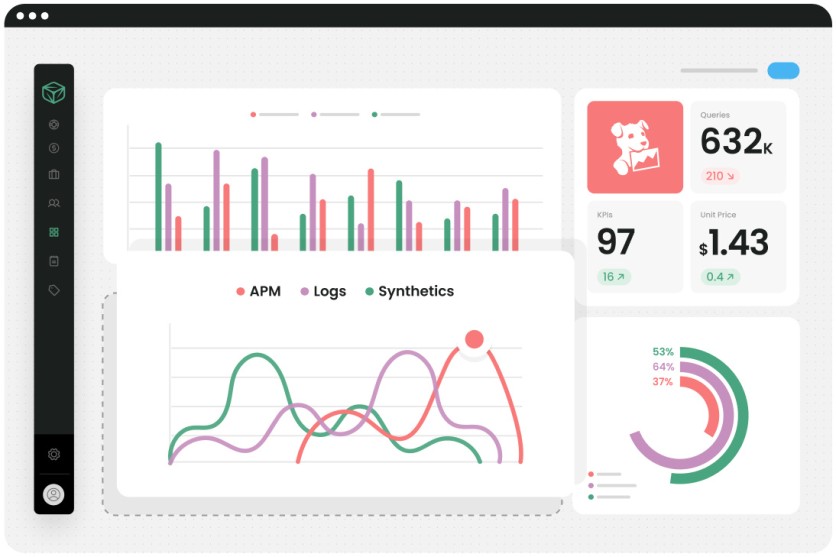
The management and projection of cloud expenditures have grown increasingly intricate as enterprises progressively transfer their workloads to cloud environments. According to a 2022 report from Flexera, approximately 32% of company budgets are squandered due to the miscalculation of usage rates. In addressing this concern, Finout emerges as a solution for overseeing cloud expenses.
What is cloud management used for?
Cloud management serves the purpose of efficiently utilizing cloud resources. It furnishes an overarching perspective of resource utilization patterns, facilitating their more judicious allocation. This comprehensive comprehension of cloud expenditure aids in the eradication of superfluous costs.
Within the realm of cloud cost management, exemplified by platforms like Finout, a streamlined estimation of costs from diverse sources such as cloud service providers, data repositories, and content delivery networks is achievable. These expenses can be amalgamated into a single, coherent invoice. Finout seamlessly integrates with various entities, encompassing AWS products, Kubernetes clusters, payment mechanisms, and beyond.
Overview of Finout
As the industry shifts toward pay-as-you-go pricing models and billing methodologies, Finout assumes a role in illuminating the profitability of cloud expenditure. It offers the capability to unravel the connection between costs and consumer behavior, as well as to uncover the expenses linked to individual Kubernetes pods operating within cloud instances, moreover, it adds an optimization layer that reduces around 30% of companies cloud spend year-over-year, without charging savings fees..
Noted by Liran Grindberg, co-founder and managing partner at Team8 Capital, Finout occupies a distinctive position in empowering effective expenditure control across diverse cloud platforms. This empowerment equips modern enterprises to optimize their cloud spending, thus advancing their overarching objectives.

Features of Finout
Finout incorporates functionalities that are absent in existing tools within the market. These features serve to enhance transparency in cloud environment pricing and the expenses linked to the cloud-native software employed by contemporary enterprises. Positioned as the pioneer in the field, Finout offers a groundbreaking FinOps platform tailored for cloud cost management. The ensuing sections delineate the attributes it encompasses:
What is FinOps?
FinOps embodies a financial discipline and cultural approach prevalent among engineering, finance, technology, and business units. Its primary aim is to attain optimal business value through enhanced cloud expenditure management. This practice fosters accountability in cloud usage and promotes collaboration to expedite product delivery, facilitating both cost control and predictability. Within the FinOps framework, teams are equipped with insights that empower cloud expenditure optimization, fostering an environment of continual improvement and operational efficiency.
Mega Bill
The Mega Bill, the flagship dashboard within Finout, serves as the hub for information. It aggregates usage-based expenses from various cloud providers and third-party Software as a Service (SaaS) offerings such as Datadog and Snowflake. Requiring minimal read permissions, this dashboard provides a comprehensive overview of costs in a singular location. This consolidation adheres to the principle of financial governance inherent in FinOps.
The dashboard facilitates the swift identification of areas where cost control measures can be implemented, supported by data insights associated with each instance. It enables the recognition of expenditure trends, fostering well-informed decision-making to optimize cloud spending. This encompasses strategies such as the implementation and evaluation of cost-saving initiatives and enhancements.
By centralizing information, Finout promotes collaboration and accountability, augmenting the efficiency of cloud cost management. The dashboard's extensive visibility and control encompass all facets of cloud expenses, spanning usage costs, data transfers, and other associated charges.
Virtual Tagging
Finout overcomes challenges in cost allocation through virtual tagging. This feature allows for the labeling and aggregation of diverse resources based on predefined rules. Functioning akin to a funnel or filter, virtual tags streamline the mapping of cloud expenses. The flexibility to rename these virtual tags as needed enhances navigation within the Mega Bill dashboard. This functionality accelerates the comprehension of distinctions in expenses, be it individual spending, team outlays, or expenses tied to specific applications, fostering efficient resource allocation.
Finout distinguishes itself by offering a comprehensive suite of features that bridge gaps in existing tools. This platform fosters greater clarity in cloud expenditure while catering to the intricate needs of modern businesses reliant on cloud-native software.

Upon configuring tags and establishing rules, Finout promptly implements updates and modifications across all cloud providers and third-party services, ensuring the consistent accuracy and timeliness of your data. This streamlined approach simplifies the management of resources and the allocation of costs throughout the entire organization.
Cost Optimizer
Driven by artificial intelligence, the Cost Optimizer for AWS within the Finout platform empowers enterprises to potentially reduce their AWS expenditure by up to 60%. This feature maintains a continuous assessment of fluctuations in customer usage patterns. Subsequently, it employs machine learning algorithms to make informed decisions regarding the necessary capacity adjustments for attaining customer-defined targets. In instances of usage decline, Finout automatically facilitates the sale of reserved capacity in the AWS marketplace, thus generating savings for customers.
The automated cost optimization solution offered by Finout serves to guide businesses toward optimal coverage with minimal risk. This is achieved through an ongoing, self-directed optimization cycle that involves the purchase and sale of reserved capacity to align with the dynamic demands of AWS services. The outcome is a reduction in AWS cloud expenses.
Remarkably, the Finout Cost Optimizer refrains from imposing additional fees for customer savings. This sets it apart from other tools in the market that often levy charges ranging from 5% to 25% on customer savings. The functionality extends its support to other prominent cloud platforms and third-party services, encompassing RDS, ElastiCache, and Redshift, among others.
Cost Anomaly Detection
Utilizing its machine learning models, Finout incorporates a feature known as cost anomaly detection. This capability empowers users to delve into the causes behind deviations in their routine spending patterns. This cloud cost management platform possesses the ability to identify and address unexpected surges in cloud-related expenses. Real-time notifications are dispatched via Slack or email to alert users about these anomalies, prompting further investigation.
Users also have the option to establish customized anomalies that align with their team's specific needs. This involves creating individualized rules, thresholds, and patterns. Such customization bestows the flexibility to spot and resolve irregularities in costs that fall under the user's purview. This tailored approach fosters a proactive and efficient style of cloud cost management.
Subscription Options
Currently, Finout extends monthly subscriptions plans tailored for companies of diverse sizes. With a fixed-transport billing system, Finout differentiate herself from her competitors, charging around 0.07% of the entire cloud spend instead of 2.5% from companies such as Cloudability or Harness.
The Business edition of this cloud cost management platform is available for $500 per month. It offers a year of data retention and access to two distinct cost centers.
In contrast, the Pro edition carries a monthly cost of $1,000. This package includes not only the SOC2 report but also an additional cost center. This empowers users to harness the full potential of the Mega Bill dashboard by connecting to a broader range of cloud providers and service bills.
FAQs
What is a cost center?
A cost center pertains to the platforms supported by Finout for sourcing cost-related data into its dashboard. These encompass AWS, GCP, Azure, Datadog, Snowflake, and others.
Are there limitations on accounts or projects?
No, there are no restrictions on the number of accounts that can be connected when utilizing Finout.
Does the platform offer technical support?
Indeed, the support team of Finout is available to provide assistance through an in-app chat interface and on dedicated Slack channels.
Conclusion
With highly technological companies such as Wiz, ZoomInfo and OwnBack adopting Finout, the company emerges as the comprehensive solution for managing cloud costs within organizations, facilitating optimized expenditure. The platform provides an all-encompassing perspective of expenses through a unified dashboard. Users gain the capacity to effectively manage, predict, and curtail unnecessary costs, thanks to the unobstructed access and visibility into various resources and instances. Those interested are encouraged to book a demo to witness firsthand how Finout can streamline and enhance their cloud cost management practices.
Read more: Top 5 FinOps Solution Providers in 2023
![Apple Watch Series 10 [GPS 42mm]](https://d.techtimes.com/en/full/453899/apple-watch-series-10-gps-42mm.jpg?w=184&h=103&f=9fb3c2ea2db928c663d1d2eadbcb3e52)



